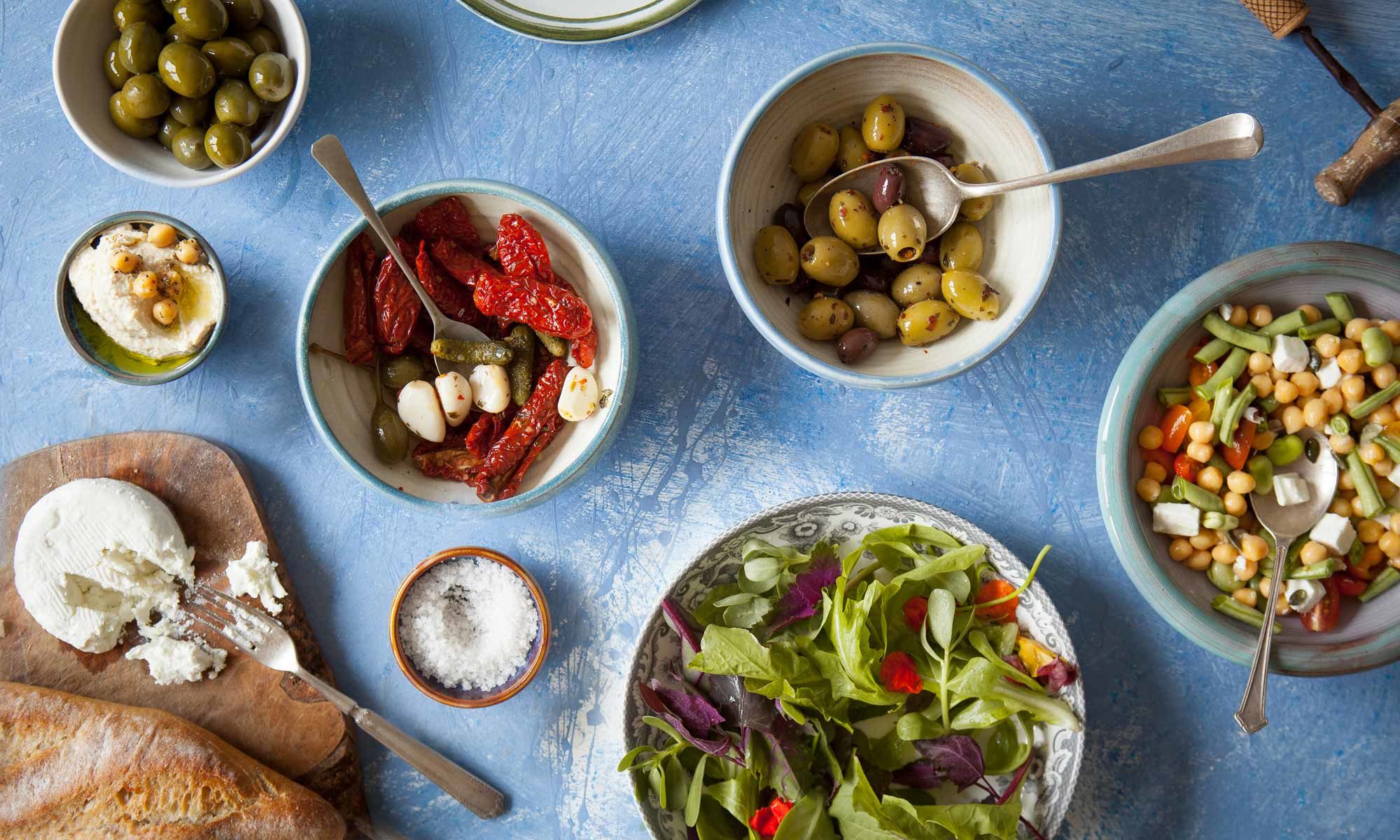Certain countries in the Mediterranean are known for the good health of their inhabitants. And certain places within those countries are known for the extraordinary good health and longevity of the people who live there.
There is Campodimele, a medieval hilltop village near Rome, where I met sprightly 102-year-old Giuseppe, who kept himself clean-shaven for ‘kissing the ladies’. There is Barbargia, in Sardinia, where 91-year-old Maria told me ‘I am strong, like a blade of grass’ as I felt her baby-soft hands. There is Symi, an island in Greece, where at 101 years old, Esmeralda was still going up and down the 387 steep steps of the village every day to sell her creamy home-made yoghurt. None of these people ever had reason to visit a doctor, and many others told me they had never had so much as a headache in their entire lives.
So what are the Mediterranean secrets of prolonged youth? Plenty of exercise and close-knit communities are certainly crucial factors. But the lion’s share of the credit may have to go to the famed Mediterranean diet.
The classic Mediterranean diet consists largely of vegetables, fruits, nuts, beans, fish, and whole grains, as well as abundant amounts of olives and olive oil. Garlic and herbs add flavour, as well as small amounts of organic unpasteurised dairy products, and the evening meal is generally washed down with a small glass of organic red wine. Chicken and eggs may be eaten in small quantities, and lean red meat is enjoyed only sparingly.
The Mediterranean diet and heart health
One of the clearest benefits of the diet is its effect on heart health, first studied by the renowned Ancel Keys, who himself died in 2004 aged 100. A recent study found that those with the most points on the ‘Mediterranean Diet Score’ had a thirty-seven per cent lower risk of fatal heart attack, whilst cardiologist Aseem Malhotra writes that ‘adopting a Mediterranean diet after suffering a heart attack is actually more powerful than aspirin, statins and even heart stents…and without the side effects.’ 1,2
The Mediterranean diet and cancer
Eating traditional Mediterranean-style foods has also been linked with lower cancer rates in several studies. 3,4,5 Vegetables provide fibre to clear toxins as well as potent antioxidant protection against ageing and cell damage, whilst certain specific elements of the diet, in particular olive oil, have been found to have direct anti-cancer effects. 6 Nuts and beans provide protein without pro-inflammatory saturated fats, and a good balance of omega 3 fats (from fish) and omega 6 fats (from nuts and seeds) is also likely to be a significant anti-cancer factor. 7
The Mediterranean diet and diabetes
The Mediterranean diet is low on the glycemic index, helping balance blood glucose and insulin levels, so it is not surprising that it is linked with a low incidence of type 2 diabetes. 8,9 Adequate protein intake from fish, nuts and beans, high-quality fibre from fruit and vegetables, and beneficial fats from olive oil, fish, and nuts help to maintain healthy blood sugar and cholesterol levels which are both credited with lower diabetes risk.
The Mediterranean diet triggers our ‘skinny’ genes
Certain foods have been identified which have the ability to activate certain genes called ‘sirtuins’, also known as ‘skinny’ genes, which protect our cells from ageing and promote loss of fatty tissue.
Twenty foods have been identified as being top sirtuin-triggers, and all are prominent features of the Mediterranean diet. The top sirtuin foods include extra-virgin olive oil, capers, chillis, celery, kale, red onions, red wine, rocket, and walnuts.
UNESCO recognition
The traditional Mediterranean diet should not be confused with its modern counterpart of pizza and pasta, but is rather a diet based on natural whole foods. Unesco has added the diet to its ‘Intangible Cultural Heritage’ list, stating: “The Mediterranean diet involves a set of skills, knowledge, rituals, symbols and traditions”. 10
This is certainly true of the longevity areas I have mentioned above, as well as other parts of the Mediterranean, which epitomise the best of the traditional local diet and food production methods. By consuming Mediterranean-style whole foods which are organic, sustainably-produced, and seasonal we can go a long way towards preserving not just our health, but also this valuable heritage.
By writer and nutritionist Sally Beare
References
- Giovanni de Gaetano (2016). Higher adherence to Mediterranean diet is associated with lower risk of overall mortality in subjects with cardiovascular disease: prospective results from the MOLI-SANI study. Presented at the ESC Congress in Rome on August 28.
- Nuts, olive oil and vegetables are the best heart medicine. Aseem Malhotra, The Times, July 22, 2016.
- D’Alessandro A, De Pergola G, Silvestris F (2016). Mediterranean Diet and cancer risk: an open issue. Int J Food Sci Nutr 67(6):593-605.
- Giacosa A et al (2013). Cancer prevention in Europe: the Mediterranean diet as a protective choice. Eur J Cancer Prev. 22(1):90-5.
- Giuseppe Grosso et al (2013). Mediterranean diet and cancer: epidemiological evidence and mechanism of selected aspects. BMC Surg 13(suppl 2):S14.
- Onica LeGendre, Paul AS Breslin,and David A Foster (2015). Oleocanthal rapidly and selectively induces cancer cell death via lysosomal membrane permeabilisation. Mol Cell Oncol 2(4): e1006077.
- Giacosa A (2013). Cancer prevention in Europe: the Mediterranean diet as a protective choice. Eur J Cancer Prev. 22(1):90-5.
- Michael Georgoulis, Meropi D. Kontogianni, and Nikos Yiannakouris (2014). Mediterranean Diet and Diabetes: Prevention and Treatment. Nutrients 6(4):1406-1423.
- Khemayanto H, Shi B (2014). Role of Mediterranean diet in prevention and management of type 2 diabetes. Chin Med J (Engl). 127(20):3651-6.
- https://ich.unesco.org/en/RL/mediterranean-diet-00884

